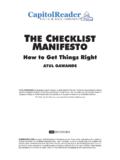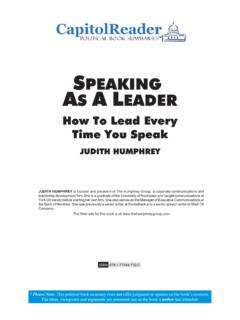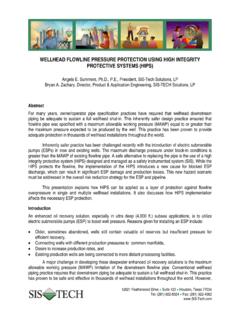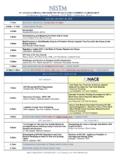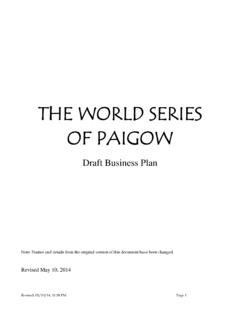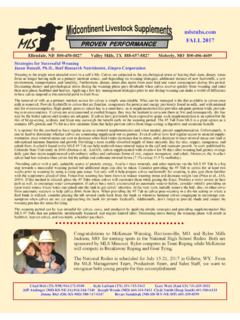Transcription of Decision Points - CapitolReader.Com
1 Decision Points . George W. Bush Author: George W. Bush Publisher: Crown Publishing Group Date of Publication: November 2010. ISBN: 9780307590619. No. of Pages: 497. (This summary was published: December 16, 2010). About the Author: George W. Bush served as the 43rd president of the United States of America. Since leaving office, he has led the George W. Bush Presidential Center at Southern Methodist University in Dallas, Texas where has been advancing initiatives in the fields of education reform, global health, economic growth, and human freedom, with a special emphasis on promoting social entrepreneurship and creating opportunities for women around the world. General Overview: The hardest yet most important part of the job of serving as president of the United States is to make the critical decisions which arise on your watch.
2 Invariably, these decisions are all tough judgement calls with very strong arguments on both sides. How you weigh the options and the principles you apply in making those decisions ultimately shapes how your presidency will be viewed in history. Presidential decisions are tough because they impact on people not only in the United States but across the globe. Sometimes you get them right, sometimes you get them wrong but the only thing that's guaranteed is there are no do-overs. The only way to survive is to do what you believe is right according to the principles and duties you uphold and then to accept the consequences come what may. Decades from now, I hope people will view me as a president who recognized the central challenge of our time and kept my vow to keep the country safe; who used America's influence to advance freedom.
3 And I. hope they will conclude that I upheld the honor and dignity of the office I was so privileged to hold. Whatever the verdict of my presidency, I'm comfortable with the fact I won't be around to hear it. That's a Decision point only history will reach.. * Please Note: This political book summary does not offer judgment or opinion on the book's contents. The ideas, viewpoints and arguments are presented just as the book's author had intended. Decision Points Page 1. Quitting Quitting drinking was one of the toughest decisions I have ever made. Without it, none of the others that follow would have been possible. Yet without the experiences of my first forty years, quitting drinking would not have been possible either.
4 So much of my character, so many of my convictions, took shape during those first four decades. My journey included challenges, struggles, and failures. It is testimony to the strength of love, the power of faith, and the truth that people can change. On top of that, it was one interesting ride.. George W. Bush was the first son born to George and Barbara Bush, and many of his earliest childhood experiences were comparable to those of many others born in the Baby Boomer generation. He attended Yale, joined the Texas Air National Guard as a trainee pilot while his father ran unsuccessfully for Senate before being appointed by President Nixon as ambassador to the United Nations.
5 George eventually ended up going to Harvard Business School to earn an MBA, and then went into the oil business in Midland, Texas in 1975. He started out as a land man searching out titles before starting a small oil exploration company of his own in 1979. That company eventually merged with another and became part of Harken Energy, a publicly traded company. George met and married Laura Welch on November 5, 1977 and they had twin girls born to them on the day before Thanksgiving 1981. Running After months of soul-searching and countless hours weighing the pros and cons, I was headed to Iowa, site of the first caucus in the 2000 presidential election. I had thought through some big questions.
6 Was I willing to forgo my anonymity forever? Was it right to subject my family to the scrutiny of a national campaign? Could I handle the embarrassment of defeat with the whole country watching? Was I really up to the job? I. believed I knew the answers, but there was no way to be sure. I did know I felt a calling to run. I was concerned about the future of the country, and I had a clear vision where I wanted to lead it. I wanted to cut taxes, raise standards in public schools, reform Social security and Medicare, rally faith-based charities, and lift the sights of the American people by encouraging a new era of personal responsibility.. George W. Bush got a taste for politics by helping out in his father's campaigns in the mid-1960s and early 1970s.
7 He ran for Congress in Texas but was unsuccessful. Meanwhile, his business career went in a different direction when a former business partner told him the owner of the Texas Rangers baseball team was considering selling. George partnered with Richard Rainwater, a successful Fort Worth investor, who agreed to raise half the money to buy the franchise if George would raise the other half. This was done and the new ownership group took over the Texas Rangers on Opening Day 1989. When his father lost the presidential election to Bill Clinton in 1992, George got the political bug again. He decided to run for governor of Texas in 1994 against a very popular incumbent, Ann Richards.
8 Getting the nomination was easy because everyone assumed Richards was unbeatable, but Bush ran a campaign based on four policy issues: education, juvenile justice, welfare reform and tort reform. When the results came in on election night, George Bush was successful in what was considered a stunning upset. He immediately got to work making reforms in those areas and was reelected as governor of Texas in 1998. During his second term as governor, George started thinking about making a run at the presidency of the United States. By this time, George Bush had teamed up with Karl Rove who he fondly termed his political mad scientist because of his encyclopedic background knowledge.
9 After about eighteen months of introspection and discussion, George authorized Karl Rove to start preparing the necessary paperwork and recruiting a network of people to raise money. He had decided to run for president of the United States. Decision Points Page 2. Personnel As a small business owner , baseball executive, governor, and front-row observer of Dad's White House, I. learned the importance of properly structuring and staffing an organization. The people you choose to surround you determines the quality of advice you receive and the way your goals are implemented. Over eight years as president, my personnel decisions raised some of the most complex and sensitive questions that reached the Oval Office: how to assemble a cohesive team, when to reshuffle an organization, how to manage disputes, how to distinguish among qualified candidates, and how to deliver bad news to good people.
10 A new president's first major personnel Decision comes months before taking office when he must decide on a vice-presidential running mate. This selection in and of itself provides a window into the candidate's Decision -making style and signals likely priorities for the country should he or she win election. George Bush asked Dick Cheney to run the vetting process for vice-presidential candidates and Cheney eventually came back with a list of nine candidates. When Cheney presented his report, George looked him in the eye and said, Dick, you are the perfect running mate. Cheney finally agreed and the ticket was set. The 2000 election for president of the United States against Bill Gore turned out to be one of the most controversial, drawn out and dramatic elections in living memory.
